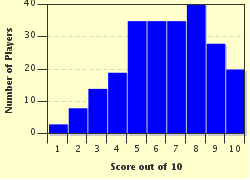Quiz Answer Key and Fun Facts
1. Rather old-fashioned, but still understood today, is the word "Dreikäsehoch" for a little boy. The word, usually used in an affectionately mocking tone, implies that the child is no taller than ... what?
2. If you hear someone describe another person as a "Rotzlöffel", what will the person thus called be like?
3. The word "Flitzpiepe" is used primarily in northern Germany to denote a person that cannot be taken seriously or did something stupid or silly. In particular, it is associated with the dialect of which city?
4. It would take a whole series of quizzes to even touch upon the unfathomably wide range of Bavarian words of abuse. For personal reasons to be explained in the info section, I'm picking the inventive curse "oachana Moosbüffe". High German: "eichener Moosbüffel". "Moosbüffel" is a (fictitious) species of "Büffel", but what animal is a "Büffel" in English?
5. If you call someone an "Evolutionsbremse", what do you imply that person does to evolution?
6. Rather than denoting a character trait, the word "Saftschubse" refers to a profession. Although slightly pejorative, it has been used ironically by the professionals in question themselves. Since 2004, "Saftschubse" has been included in the Duden dictionary. Which job does it refer to?
7. "Holzkopf" has been around for a long time and is gradually going out of fashion. "Kopf" is German for "head", but which material is the head of a "Holzkopf" apparently made of?
8. The first thing you learn about Bavarians is that they are regarded as territorial and patriotic, and they do nothing to do away with that stereotype. Even someone who is not from Bavaria will surely know that, to a Bavarian, everyone who hails from north of the Danube River is a "Breiß" or "Preiß" ("Preuße" in High German). Historically, where does a "Preuße" really come from?
9. A famous German children's book by Heinrich Hoffmann is "Der Struwwelpeter" (1845). It contains illustrated, rhymed stories about children that behave mischievously in one way or another. Each bad child gets their comeuppance in the end. An English translation called "Slovenly Peter" was made by Mark Twain in 1848. Several characters from that book have entered everyday language in Germany; among others, "Zappel-Philipp" (or "Zappelphilipp", without the hyphen), to denote a child that cannot sit still. Which character is it?
10. To whom of the following persons would the term "Skandalnudel" apply best?
Source: Author
PearlQ19
This quiz was reviewed by FunTrivia editor
stedman before going online.
Any errors found in FunTrivia content are routinely corrected through our feedback system.

